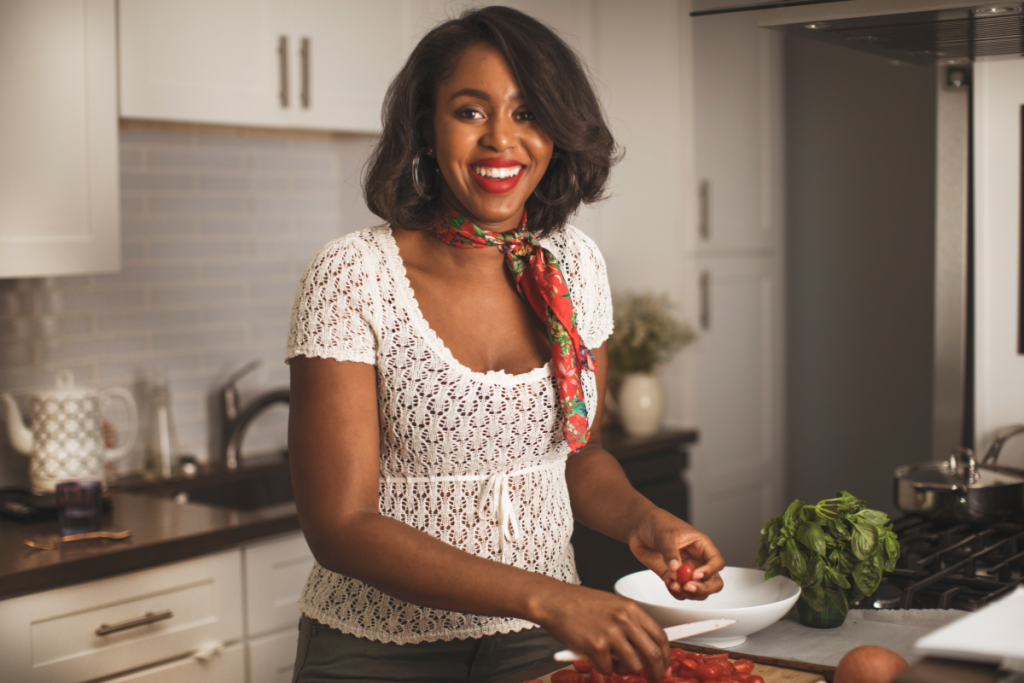From Chapati to Culinary Empire: How Kiano Moju is Reinventing African Cuisine
Kiano Moju reimagines African cuisine, bridging continents and generations through innovative cooking and storytelling.

This article originally appeared as “Kiano Moju: Uniting Generations Through Food” in the print edition of Radiant No. 15.
In a world where many families are separated by miles, continents, and oceans, food helps us maintain traditions, feed nostalgia, and unite generations. Food has the power to connect us with our relatives alive and passed on, present and far away. No one is more conscious of this than international chef Kiano Moju, founder of Jikoni Culinary Creative Studio and former video producer at BuzzFeed Tasty. Generations of women helped build her culinary foundation, but the innovative path she travels now is all her own.
Radiant Health: For many people, food and family are intimately connected. What is food’s role in your family?
Kiano Moju: Like in most cultures, food is at the center of everything we do. Every gathering we have. My grandmother to this day will wake up and just make food. In Maasai culture there’s nothing like inviting someone to come a certain day; people just show up. You’re cooking all the time with the expectation of socializing around food.
I remember when I learned about American dinner parties, probably in college. The concept of having people over after the food is already made was the most alien thing to me, because I always saw people socializing around the preparation of food. If there was a Kenyan party, 90% of it was people hanging around making the food together, and eating at the very end.
With my family, while you’re cutting the greens and sorting through the peas, you’re having conversation and catching up. The meal is the final 10% of what you do.
RH: How has your family influenced your approach to cooking?
KM: I was able to cook more as a child because of my mom’s lack of care for cooking. To this day, cooking is a chore for her. When I was younger and she would be rolling out chapati, a Kenyan bread, she would give me a small piece of dough just to play with, but I wanted everything I did to look like hers. She eventually enrolled me in cooking camp and I learned how to cook from outside people. I learned technical skills and developed a culinary foundation at this camp, which helped me to not be a burden when I was cooking with my mom.
I learned a couple traditional dishes through my mom, but most of my cultural education happened during summers at my grandparents’ ranch in Kenya. Since I was 6 years old, we’d spend every other summer vacation at our ranch in rural Kenya with my very traditional Maasai family.
Our ranch had cows, goats, chickens, and not much electricity except through a generator. If we wanted to cook, we were gathering wood, sorting beans all day, and slaughtering chickens. I learned all about traditional cooking because there was no other activity to do, other than working on the ranch. I would just sit there and help when my grandmother and her friends would hang out and cook, and that’s where I learned a lot about making Kenyan cuisine.

RH: Who in your family inspires your cooking the most?
KM: Traditional Maasai cooking doesn’t have any spices to it; it’s very technical from the bottom up—making your own fire and killing your own animal. But when it comes to flavoring and seasoning food, my uncle’s wife Tilly was the first person in my family that was really into using spices.
There was a point when I was a teenager cooking with her that I got really excited about flavor combinations. My aunt came from a different Maasai clan and was more experimental than everyone else in my family, so she and I would have so much fun creating. When she came to America and lived down the road from us, I experienced a lot of innovation just cooking with her. She was a big motivator and inspiration for me to try out things in the kitchen.
RH: As your personal and professional culinary skills have developed, what kind of role reversals have you seen within your family?
KM: During the holidays when I was younger, everyone would have a job and generally one person would be in charge of a meal. I’m now in charge of all of them, even though I’m the youngest of the adults.
I built trust within my family in the kitchen. It did not come easily, and it took many years for them to let me cook and to like what I cook. That’s changed and developed over the years, so being in charge of all the holiday meals before I even turn 30 is something I’m really proud of. The trust came through the palate and through dedication and research.
My grandmother was the hardest one to convince. When I was younger, my mom would pack me pasta and ramen on our trips to Kenya, because when you’re traveling your stomach often doesn’t agree with many local foods at the beginning. My grandma didn’t grasp that idea because she hadn’t traveled anywhere yet. She thought I didn’t like Kenyan food, so my food was always seen as a separate thing, like my palate was separate. So, when I would try to contribute to family food, my grandma would say no.
More recently, I was with my grandma while she staying with my mother on her visit to America for the holidays. I cooked shakshuka for breakfast, and my grandma ate it because she had no other choice. This was the first dish of mine that she really ate. She said, “Oh, it’s actually good!” It took my whole life for my grandma to even want to put a fork into something I cooked.

Likewise, I was in Kenya a few summers ago for my uncle’s wedding. Our house there has two kitchens, and everyone would come knocking at my kitchen door to ask what I was making. I made them Spanish tortillas—just eggs, potatoes, and onion—and I kept getting knocks on the door asking for more. I still have uncles texting me about it.
RH: Family recipes are a way of keeping our ancestry alive. Is there one dish that makes you feel particularly connected to your family around the world?
KM: Chapati, 100%. It’s a flatbread every Kenyan makes, and not everyone makes it great. It’s that one dish where, when someone volunteers to make it, everyone in their head says, Dear God, no. It has such simple ingredients: flour, water, a little bit of fat and salt. That’s it. But getting that balance is an unmeasured art. Being good at making chapati is the ultimate cooking status symbol in our family. My grandma has been unrivaled as the best chapati maker. In America, it used to be my aunt Tilly, but by everyone’s confession I’ve surpassed them all.
With tradition, they teach you how to do, but not why, like [the study of] food chemistry does. Every woman who has come into my grandma’s kitchen has their way of doing it. I’ve just been collecting little nuggets to develop and hone my own technique. I did a deep dive into the food chemistry behind everything and swapped out the type of fat I use to make a softer, flakier chapati than everyone else. I’m now in the difficult position of trying to write down that recipe, because it’s hard to do properly and I want people to have the opportunity for success. Because I tell you, bad chapati—you’ll see it thrown out and given to the dogs.
RH: As the coronavirus pandemic intensifies worldwide, we’re in very challenging times. How do you show care and comfort through your food?
KM: This is hard for me because I enjoy cooking exponentially more than I do eating. It’s a blessing, because I don’t like fitness; it’s what keeps me fitting in all my clothing.
I use food as an excuse to get people together because I grew up in this culture where people cook food together and gather. Now cooking and not sharing with anyone is very alien and also fatiguing to me, because there’s no conclusion to it. For me, the conclusion isn’t the cooking being done; it’s the sharing, and there isn’t much of that right now.

On Saturday, I made little care packages for my friends and my mom. I lined up little brown bags and put my gloves on and baked cookies and a big batch of spaghetti sauce and cabbage rolls. Then I drove around and left them at people’s doors. I called them as I drove away. Cooking and sharing brought me so much joy, especially when friends sent selfies of them enjoying the food and cookies.
RH: Tell us more about your most recent business venture, Jikoni Culinary Creative Studio.
KM: Had you asked a week ago, my answer would have been different. Our primary business was kitchen rental and events. Production companies rent the space and run cooking shows out of it. With businesses shut down at the moment, our revenue is frozen.
I’ve had to pivot our business model. It will still include rentals and events, whenever we’re allowed to do that again, but my days have been spent building a new website for Jikoni [Swahili for “kitchen”] to become a space to celebrate African culture through recipes and other food and lifestyle content. I’m building a community focused on African diaspora cuisine, aiming to create an editorial vertical for this audience. Creating online content has accelerated my timeline by a year and a half.
I’m creating a model that blends editorial content with crowdsourced recipes and stories from users. For this type of content, too many people have had their story told for them inaccurately. I really just want people to have an active hand in their storytelling.
You know African people, we always want to put a voice to something. I can’t tell someone this is the definitive way to make jollof rice. They’d find me and kill me. But think of a space where many people can share their own version. We can support them with the skills we have as culinary content creators to develop a nice video to accompany it, so people can make it at home. I think it’s just in our culture to share.
In August 2024, Kianu Moju released her first book, AfriCali, published by Simon & Schuster. You can learn more about Jikoni Culinary Creative Studio at www.jikonicreative.com.
This article originally appeared as “Kiano Moju: Uniting Generations Through Food” in the print edition of Radiant No. 15.


